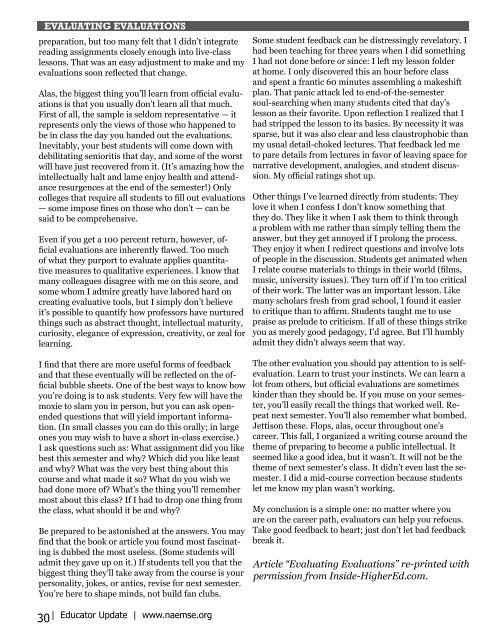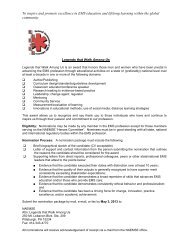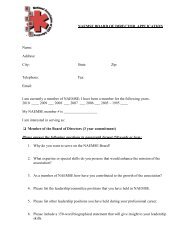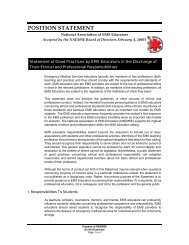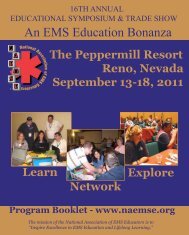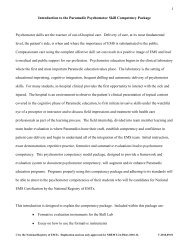What Every EMS Educator Should Know About
What Every EMS Educator Should Know About
What Every EMS Educator Should Know About
Create successful ePaper yourself
Turn your PDF publications into a flip-book with our unique Google optimized e-Paper software.
EVALUATING EVALUATIONS<br />
preparation, but too many felt that I didn’t integrate<br />
reading assignments closely enough into live-class<br />
lessons. That was an easy adjustment to make and my<br />
evaluations soon reflected that change.<br />
Alas, the biggest thing you’ll learn from official evaluations<br />
is that you usually don’t learn all that much.<br />
First of all, the sample is seldom representative — it<br />
represents only the views of those who happened to<br />
be in class the day you handed out the evaluations.<br />
Inevitably, your best students will come down with<br />
debilitating senioritis that day, and some of the worst<br />
will have just recovered from it. (It’s amazing how the<br />
intellectually halt and lame enjoy health and attendance<br />
resurgences at the end of the semester!) Only<br />
colleges that require all students to fill out evaluations<br />
— some impose fines on those who don’t — can be<br />
said to be comprehensive.<br />
Even if you get a 100 percent return, however, official<br />
evaluations are inherently flawed. Too much<br />
of what they purport to evaluate applies quantitative<br />
measures to qualitative experiences. I know that<br />
many colleagues disagree with me on this score, and<br />
some whom I admire greatly have labored hard on<br />
creating evaluative tools, but I simply don’t believe<br />
it’s possible to quantify how professors have nurtured<br />
things such as abstract thought, intellectual maturity,<br />
curiosity, elegance of expression, creativity, or zeal for<br />
learning.<br />
I find that there are more useful forms of feedback<br />
and that these eventually will be reflected on the official<br />
bubble sheets. One of the best ways to know how<br />
you’re doing is to ask students. Very few will have the<br />
moxie to slam you in person, but you can ask openended<br />
questions that will yield important information.<br />
(In small classes you can do this orally; in large<br />
ones you may wish to have a short in-class exercise.)<br />
I ask questions such as: <strong>What</strong> assignment did you like<br />
best this semester and why? Which did you like least<br />
and why? <strong>What</strong> was the very best thing about this<br />
course and what made it so? <strong>What</strong> do you wish we<br />
had done more of? <strong>What</strong>’s the thing you’ll remember<br />
most about this class? If I had to drop one thing from<br />
the class, what should it be and why?<br />
Be prepared to be astonished at the answers. You may<br />
find that the book or article you found most fascinating<br />
is dubbed the most useless. (Some students will<br />
admit they gave up on it.) If students tell you that the<br />
biggest thing they’ll take away from the course is your<br />
personality, jokes, or antics, revise for next semester.<br />
You’re here to shape minds, not build fan clubs.<br />
Some student feedback can be distressingly revelatory. I<br />
had been teaching for three years when I did something<br />
I had not done before or since: I left my lesson folder<br />
at home. I only discovered this an hour before class<br />
and spent a frantic 60 minutes assembling a makeshift<br />
plan. That panic attack led to end-of-the-semester<br />
soul-searching when many students cited that day’s<br />
lesson as their favorite. Upon reflection I realized that I<br />
had stripped the lesson to its basics. By necessity it was<br />
sparse, but it was also clear and less claustrophobic than<br />
my usual detail-choked lectures. That feedback led me<br />
to pare details from lectures in favor of leaving space for<br />
narrative development, analogies, and student discussion.<br />
My official ratings shot up.<br />
Other things I’ve learned directly from students: They<br />
love it when I confess I don’t know something that<br />
they do. They like it when I ask them to think through<br />
a problem with me rather than simply telling them the<br />
answer, but they get annoyed if I prolong the process.<br />
They enjoy it when I redirect questions and involve lots<br />
of people in the discussion. Students get animated when<br />
I relate course materials to things in their world (films,<br />
music, university issues). They turn off if I’m too critical<br />
of their work. The latter was an important lesson. Like<br />
many scholars fresh from grad school, I found it easier<br />
to critique than to affirm. Students taught me to use<br />
praise as prelude to criticism. If all of these things strike<br />
you as merely good pedagogy, I’d agree. But I’ll humbly<br />
admit they didn’t always seem that way.<br />
The other evaluation you should pay attention to is selfevaluation.<br />
Learn to trust your instincts. We can learn a<br />
lot from others, but official evaluations are sometimes<br />
kinder than they should be. If you muse on your semester,<br />
you’ll easily recall the things that worked well. Repeat<br />
next semester. You’ll also remember what bombed.<br />
Jettison these. Flops, alas, occur throughout one’s<br />
career. This fall, I organized a writing course around the<br />
theme of preparing to become a public intellectual. It<br />
seemed like a good idea, but it wasn’t. It will not be the<br />
theme of next semester’s class. It didn’t even last the semester.<br />
I did a mid-course correction because students<br />
let me know my plan wasn’t working.<br />
My conclusion is a simple one: no matter where you<br />
are on the career path, evaluators can help you refocus.<br />
Take good feedback to heart; just don’t let bad feedback<br />
break it.<br />
Article “Evaluating Evaluations” re-printed with<br />
permission from Inside-HigherEd.com.<br />
30<br />
| <strong>Educator</strong> Update | www.naemse.org


